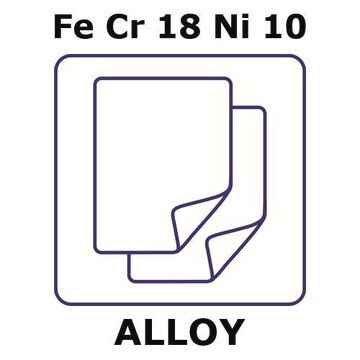GF35667221
Tin
rod, 200mm, diameter 9.5mm, 99.75%
Sinonimo/i:
Tin, SN007940
Autenticatiper visualizzare i prezzi riservati alla tua organizzazione & contrattuali
About This Item
Formula empirica (notazione di Hill):
Sn
Numero CAS:
Peso molecolare:
118.71
Numero MDL:
Codice UNSPSC:
12352300
ID PubChem:
NACRES:
NA.23
Prodotti consigliati
Saggio
99.75%
Forma fisica
rod
Produttore/marchio commerciale
Goodfellow 356-672-21
Resistività
11 μΩ-cm, 20°C
L × diam.
200 mm × 9.5 mm
P. eboll.
2270 °C (lit.)
Punto di fusione
231.9 °C (lit.)
Densità
7.310 g/mL at 25 °C (lit.)
Stringa SMILE
[Sn]
InChI
1S/Sn
ATJFFYVFTNAWJD-UHFFFAOYSA-N
Categorie correlate
Descrizione generale
For updated SDS information please visit www.goodfellow.com.
Note legali
Product of Goodfellow
Certificati d'analisi (COA)
Cerca il Certificati d'analisi (COA) digitando il numero di lotto/batch corrispondente. I numeri di lotto o di batch sono stampati sull'etichetta dei prodotti dopo la parola ‘Lotto’ o ‘Batch’.
Possiedi già questo prodotto?
I documenti relativi ai prodotti acquistati recentemente sono disponibili nell’Archivio dei documenti.
M R Krigman et al.
Neurotoxicology, 5(2), 129-139 (1984-01-01)
The toxicology of tin is almost entirely the toxicology of the organic compounds of tin, for the metal itself and its inorganic compounds appear to be nearly harmless for practical purposes. Furthermore, the neurotoxicity of organotin is essentially that of
Heinz Rüdel
Ecotoxicology and environmental safety, 56(1), 180-189 (2003-08-14)
This article reviews the literature related to the bioavailability of tin, inorganic tin compounds, and organotin compounds. On the one hand, the toxicity of metallic tin and inorganic tin compounds is low. In aqueous systems, the potential bioavailability of tin
Steve Blunden et al.
Food and chemical toxicology : an international journal published for the British Industrial Biological Research Association, 41(12), 1651-1662 (2003-10-18)
Tinplate is light gauge, steel sheet or strip, coated on both sides with commercially pure tin and has been used for well over a hundred years as a robust form of food packaging. Altogether, about 25,000 million food cans are
Commonly used methods of analysis for tin in foods.
W Horwitz
Journal - Association of Official Analytical Chemists, 62(6), 1251-1264 (1979-11-01)
P Mushak
Neurotoxicology, 5(2), 163-176 (1984-01-01)
Methods for both total and form-variable tin analysis in biological media are reviewed. While total tin analysis was common in the past, and in some cases still is, better understanding of the toxicology and toxicokinetics of organotins in biological systems
Il team dei nostri ricercatori vanta grande esperienza in tutte le aree della ricerca quali Life Science, scienza dei materiali, sintesi chimica, cromatografia, discipline analitiche, ecc..
Contatta l'Assistenza Tecnica.





